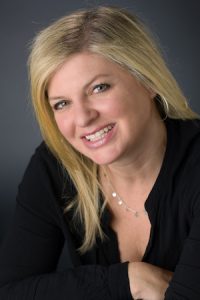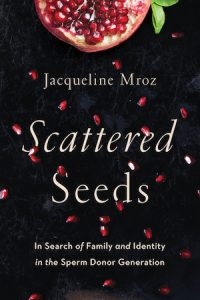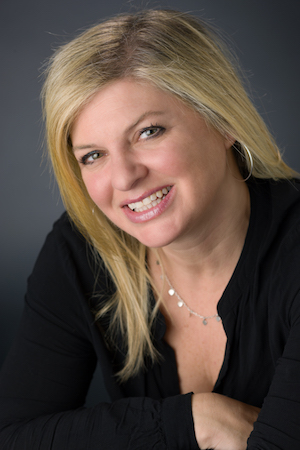We met Jacqueline Mroz when she put together the Montclair Literary Festival. From our first meeting and all the way through the end of the festival, she was smart, she was funny, she showed up on time, and she smelled good. So we were not surprised to learn that she had gotten a book deal. Now that Scattered Seeds: In Search of Family and Identity in the Sperm Donor Generation is out, we thought we’d pick her brain about what it’s like to navigate the rocky seas of the publishing world.
Read this interview of the HuffPost.

Jacqueline Mroz
The Book Doctors: What was the inspiration for Scattered Seeds?
Jacqueline Mroz: The inspiration for the book came from a New York Times article that I wrote in 2011 about a sperm donor who had 150 kids. Once I started looking into the fertility industry, I found it was full of fascinating stories and people.
TBD: How is it possible that one man biologically fathered 150 children?
JM: The sperm bank continued to sell this man’s sperm for years–and it was very popular. Most donors are asked to donate around 3 times per week. Also, each donation is divided up into somewhere between 8 and 25 vials, which are then sold to women around the world. Those numbers can really start to add up!
TBD: How did you get that great article in the New York Times? What was the fallout from it?
JM: I came across the original news story through my sister, who was trying to have a baby on her own, using donor sperm. She noticed on a message board for Single Mothers by Choice that one mom wrote about her unease when she found out that her daughter had 75 half siblings. I was intrigued and decided to dig deeper—that’s when I found out that there was a sperm donor with 150 children. The article was very popular and was picked up all over the world. As a result of the story, a state legislator in NYC introduced a bill to limit the number of kids that a sperm donor could have—but she wasn’t able to get enough support to push the bill through.
TBD: How do you think that the process of sperm donation, and the industry it has spawned, ultimately affects kids and parents?
JM: Sperm donation can be great for families or women who aren’t able to have kids otherwise, but for some children who are born through anonymous sperm donors, it can be difficult. Some of these kids become confused about their identity, and end up endlessly searching for their biological fathers, trying to figure out who they are and what they inherited from their donors. There’s also the risk of rare, genetic diseases being passed on from donors to their biological children, and then spreading through the population. (I wrote about this in another Times article.)
TBD: What are some tips for people who want to artificially inseminate?
JM: For someone who is looking to use a sperm donor, I would recommend using the Sperm Bank of California in Berkeley. They’re extremely ethical, they limit the number of kids that a sperm donor can have, they’re a nonprofit, and they try to connect kids with their donors when they’re of age. I would also make sure that the sperm bank tests its donors for a significant number of genetic diseases — and I would ask how many kids the donors has already!
TBD: Why isn’t there more oversight into what is one of the most personal areas of human existence?
JM: It’s hard to get the government to institute more oversight over the industry since there are actually few people that really want it — the parents want to have a baby, and the doctors and sperm banks want to help people — and make money. But that’s starting to change, as donor-conceived children are starting to come of age and demanding their rights. The other problem with oversight is it’s a slippery slope, and many are afraid it could lead to (even) more regulation of abortion.
TBD: What was your takeaway from talking to same-sex couples who have used artificial insemination to have a child?
JM: They are grateful for this chance to have children. Also, some of the single mothers by choice that I spoke to have been particularly good at finding and reaching out to their kids’ half-siblings — it gives them an extended family that their children might not otherwise have. Many visit each other and take vacations together.

Seal Press
TBD: How did you go about getting this book deal?
JM: The newspaper article was extremely popular, so I used that and my proposal to find an agent. My agent, Jane Dystel, is amazing!
TBD: We hate to ask you this, but what advice do you have for writers?
JM: Writers’ groups can be very helpful, especially if you’re having trouble finishing something that you’re working on. You can ask the other writers to give you a deadline to help you get things done.
Jacqueline Mroz is a veteran journalist specializing in reproductive and family issues. She lives in Montclair, New Jersey, with her husband and three children.
Arielle Eckstut and David Henry Sterry are co-founders of The Book Doctors, a company that has helped countless authors get their books published. They are co-authors of The Essential Guide to Getting Your Book Published: How To Write It, Sell It, and Market It… Successfully (Workman, 2015). They are also book editors, and between them they have authored 25 books, and appeared on National Public Radio, the London Times, and the front cover of the Sunday New York Times Book Review.

